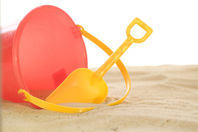
Let me know if you've come up with any activities for your toddler by leaving a comment in the box below. Have fun and be creative!
Download the document here:
| 20_summertime_speech__language_activities_for_toddlers.pdf |
 Here is a list of fun speech and language activities you can do with your toddler this summer. I've also listed the skills that each activity targets. Of course there are many other things you can do to help keep your toddler entertained this summer, and most can target your toddler's speech and language skills. Let me know if you've come up with any activities for your toddler by leaving a comment in the box below. Have fun and be creative! Download the document here:
2 Comments
I recently wrote a blog post called, Help! My Toddler is Not Talking. In that post I explained what you should do if you suspect your toddler may have a speech or language delay. You can contact your toddler’s pediatrician, research speech therapists in your area, or ask about early intervention services.
The next step to determine if your toddler has a speech or language delay is to have an evaluation completed. If your child is between ages 0-3 this can be done by early intervention services. These programs are federal programs under Part C of the Individuals with Disabilities Education Act (IDEA), and evaluations are free. Plus, you don’t need a referral from your pediatrician to get services. You can find out more information about your state’s program on this website http://nichcy.org/babies/services. Here’s how the early intervention program assessment process works: Before the assessment/evaluation:
The assessment/evaluation:
The assessment/evaluation results
This is just an overview of what the assessment process will look like. Please note that each state has different assessment standards and timelines. Not all assessments will be alike. Now that you know how the early intervention program assessment/evaluation process works, we will talk about speech therapy and what your toddler's sessions will look like next. Stay tuned! 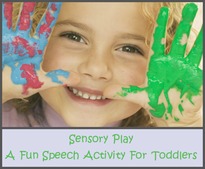 One of my most favorite speech activities for toddlers is sensory play. It is a relatively new term in the world of child development. As children, my generation (I'm in my mid 30's) often played outside for hours on a regular basis. I can remember playing in the neighborhood with my sister all day long and hearing my mom yell for us to tell us it was time to come home. Unfortunately those days are few and far between. Our children's generation doesn't get that opportunity like we did. Thanks to television, technology, video games, and even crime and violence rates, children don't play outside like they should. So, we've got to come up with other ways to bring those sensory experiences to them. But, what is sensory play? It allows a toddler to use one or more of the five senses (touch, smell, taste, sight and hearing) to learn more about his or her environment. By stimulating the senses you are helping your toddler improve language and basic motor skills. It also helps toddlers develop cognitively, linguistically, socially and emotionally, physically and creatively. Some parents may refer to sensory play as messy play, but you can make it as messy or less messy as you would like! To improve toddler language development through sensory play let your toddler touch and feel various textures such as soft, rough, and wet. Include as many textures as you can. Examples of these textures include putting your toddler’s hands in a bowl of dry rice, sand, and water. You can also have your toddler paint with finger paints and shaving cream or search for small toys in a bowl of water or rice. Talk about the textures and what you’re toddler is doing with them. For example when playing in a sand box you can say, “The sand is rough and wet. Oh look, you're pouring the sand into the bucket.” Here is a list of several sensory activities for babies and toddlers. Don't forget that you can use these activities to build toddler speech and language skills! 5 Sensory Play Ideas For Toddlers 9 Simple Sensory Play Ideas Activities for toddlers: sensory play 15 Quick Sensory Activities from Hands on Moms 56 Sensory Play Activities for Babies To learn more speech and language tips to help your toddler talk and communicate faster, be sure to check out my book on Amazon Kindle, Talking With Toddlers - 52 Tips to Boost Speech and Language Skills. 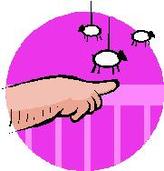 As many of you know I have 15 month old identical twin girls. They are starting to say a few words and babble all the time. They are such a joy and each stage is more fun than the last. Although, I do confess that I would love for them to be toddlers as long as possible! My twin girls are constantly communicating with my husband and me, but it's not necessarily through words. They reach, point, fuss, and gesture their way through the day. Keep in mind that communication is not just words and talking! I've been working as a speech-language pathologist for 12 years now (wow....I just realized I finished graduate school in 2001....time flies!), and one thing I've noticed from many parents of toddlers is that they don't realize that their toddler is communicating with them. Some parents think the only way to communicate is through words, but there are so many other ways too! Some of these ways include:
Just last night, my husband and I were playing with our girls before bed. They love to sing a song my mother taught us called "Trot, Trot to Boston." We bounce them up and down and gently push them back at the end of the song. They love the bouncing and pushing back part. To let us know that they wanted to sing the song again, they climbed on us and started bouncing up and down. That was their way of saying, "Hey, I want to do that again. It's so much fun!" My twin girls also love to play peek-a-boo. They grab a blanket, look at us, and put it over the heads. They are telling us that they want their daddy and me to pull the blanket off of them and say "boo!" Start paying attention to your toddler's communication cues. Your child is really trying to communicate with you to the best of his or her ability. Of course the end goal should be to use words, but it may take your toddler some time until he or she is able to verbally express wants and needs. Continue to talk as much as you can to your toddler and model the words that he or she may be trying to say. To learn more speech and language tips to help your toddler talk and communicate faster, be sure to check out my book on Amazon Kindle, Talking With Todders - 52 Tips to Boost Speech and Language Skills. 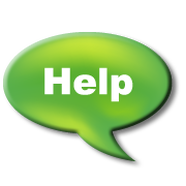 Are you worried that your your young child is not reaching the typical toddler speech and language developmental milestones? Do you feel your toddler is not saying as many words and phrases that he or she should be saying? If you think your toddler may be delayed in speech and language then this blog post will help! Keep in mind that every toddler is different. Each child develops at his or her own pace, but some toddlers may not reach developmental milestones as expected. So, what should you do as a parent if you suspect your toddler may have a speech or language delay? Contact your toddler's pediatrician Talk to your pediatrician about your concerns regarding your toddler's speech and language development. Ask what he or she thinks and determine if speech therapy may be necessary. Research speech therapists in your area A speech-language pathologist provides speech therapy for their clients and patients, and this includes both adults and children. The overall goal for those who are getting speech therapy is to develop and/or regain speech and communication skills to the best possible level. The length of therapy mostly depends on the severity of the communication disorder and the motivation of the child. You can find a licensed speech therapist in your area by visiting www.asha.org or by doing an internet search on your favorite search engine. Ask about early intervention services Your toddler may be eligible for speech therapy services provided by your state’s early intervention program. These programs are federal programs under Part C of the Individuals with Disabilities Education Act (IDEA) that provide services to children age birth to three and their families. Children are also entitled to a free developmental evaluation by the program. To find out more information about Part C of IDEA and your state’s program check out the following website http://nichcy.org/babies/services. You do not need a referral from your pediatrician to participate in early intervention services. I am very partial to early intervention services. I contracted with Georgia's early intervention program, Babies Can't Wait, the past eight years through my business. I am now contracting with Mississippi's program, First Steps. All speech-language pathologists are licensed and certified and go through the same licensing process as speech-language pathologists who work in hospitals and private practices. Early intervention provides services in a toddler's natural environment and teaches parents and caregivers how to implement communication strategies to use at home between therapy sessions. I highly recommend that you take advantage of your state's early intervention program. Toddler speech and language evaluations are free, and they will work with you on the cost of therapy. A toddler will not be denied services based on a family’s inability to pay. If you have any questions about early intervention please don't hesitate to ask me. Feel free to email me at [email protected] or leave a comment below. To learn how you can help your toddler talk and communicate faster, be sure to check out my book on Amazon Kindle, Talking With Todders - 52 Tips to Boost Speech and Language Skills. 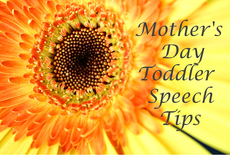 Mother's Day is right around the corner. It's this Sunday, May 12th. You can help your toddler make a Mother's Day gift or craft while working on toddler speech and language skills. Here's how to do it: Make sure you reinforce good speech and language during the activities. Use correct grammar and sentence structure. Clearly pronounce your words and sentences when communicating with your toddler. If your toddler says a word incorrectly or uses improper sentence structure just go back and correctly say what he or she said. Talk about what your toddler is doing as he or she is completing the craft. This is called parallel talk. Talk about and describe everything your toddler is doing as he or she is doing it. This will help build both receptive and expressive language skills. Listen to your toddler Acknowledge what your toddler says to you. Let your child know that what he or she says is important even if you cannot understand it. Your toddler will want to talk and communicate with you because you value what he or she has to say to you. Praise your toddler Make sure to give your toddler lots of praise when he or she makes attempts at communicating. Once you give your toddler praise you’ll notice that he or she will continue to try to communicate with you which will get your toddler talking and communicating even faster! Here is a list of some toddler friendly Mother's Day crafts and activities you can pair with the above speech tips to help your toddler talk:
To learn more speech and language tips to help your toddler talk and communicate faster, be sure to check out my book on Amazon Kindle, Talking With Todders - 52 Tips to Boost Speech and Language Skills. Did you know that the month of May has been designated as Better Hearing and Speech Month? According to the American Speech-Language Hearing Association (ASHA), this annual event provides opportunities to raise awareness about communication disorders and to promote treatment that can improve the quality of life for those who experience problems with speaking, understanding, or hearing.
Speech-language pathologists and audiologists use this time to broaden their profession by attending conferences and continuing education events. They also educate their clients, patients, students, and their community about the fields of audiology and speech-language pathology. If you are a teacher, daycare provider, or someone who values communication, please share this information with your students, parents, and as many people as possible. So, where can you get more information and materials promoting Better Hearing and Speech Month? Try these free and fun informative resources!
Be sure to like the Talking With Toddlers Facebook Page. We will be posting free giveaways throughout the month in honor of Better Hearing and Speech Month. You don't want to miss out! |
AuthorWelcome! I'm Rebecca Haas, toddler speech-language pathologist and mother to identical twin baby girls. On this blog you'll find articles, resources, and lots of information about early childhood and speech and language development. I hope you find this helpful! Archives
October 2018
Categories
All
This blog is featured on:
|
||||||
|
© 2015 Talking With Toddlers. All Rights Reserved.
|
